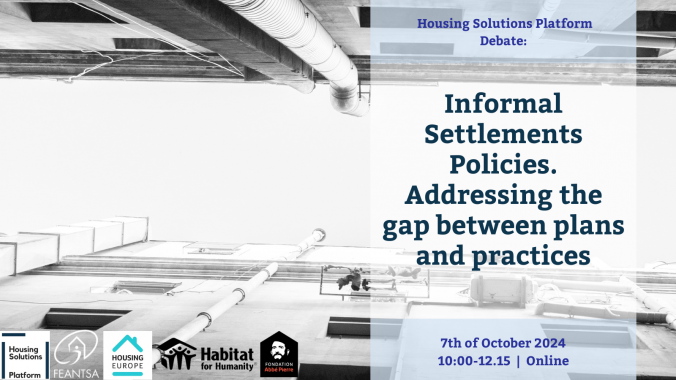Informal Settlements Policies. Addressing the gap between plans and practices
Housing Solutions Platform Debates
Online, 7 October 2024Save the date
Slums or informal settlements have been defined as a particular type of inadequate housing characterized by insecurity of tenure, lack of access to basic services and infrastructure, as well as dwellings that lack quality/durability.
Within the ETHOS definition, people living in informal settlements, although they are not roofless, they are nonetheless homeless, as they live under the threat of eviction in unfit structures. Thus, addressing the living conditions of people in informal settlements lies at the intersection of homelessness and housing policies.
Informal settlements have been historically considered a feature of urbanization processes, where internal and external migration together with poverty and housing exclusion lead to the formation of such alternative precarious living spaces. However, the role of public authorities in such processes should not be overlooked, as they sometimes actively contribute to them through repeated evictions from the city and institutionalized segregation. Roma people, migrants and other racialized communities are disproportionately affected by housing deprivation and informal living. In the context of the Roma Inclusion Strategy, the European Parliament Resolution in 2022 called for an EU action plan for Roma settlements and the Council of the European Union, under the Spanish Presidency in 2023, invited the Commission to support investment of EU funds in housing and infrastructure to address inadequate and segregated settlements. Such calls reference Principle 19 of the European Pillar of Social Rights, the 2021 Lisbon Declaration on the European Platform on Combatting Homelessness, as well as the UN Sustainable Development Goals, amongst which Goal 11 explicitly targets people living in slums, informal settlements or inadequate housing.
Despite this supra-national framework, worrying developments have been taking place in various national contexts, where evictions from settlements, lack of rehousing options and inadequate social housing supply for the most vulnerable contribute to further pushing affected communities to the margins. A lack of proper (re)housing policies, the tightening of anti-squatting laws, as for example in France and Belgium, feeds into increasing homelessness and housing exclusion through more evictions that remove people from one space or settlement, while pushing them to another such informal living situation.
The aim of our debate is to discuss informal settlement policies in relation to adequate rehousing, although upgrading and regularization of informal settlements represent an alternative policy direction, albeit as potentially controversial in its implementation. We bring together representatives of social services organizations, social housing providers, activist collectives and researchers to analyze obstacles and achievements in such rehousing programs in France, Italy, Portugal, Belgium and Romania.
Draft programme
Programme
10:00-10.55: Between national and local policies. Case study presentations Round 1
The slum clearance programme in France
- Sarah Coupechoux - FAP
- Célia Mougel - Romeurope, "L’Observatoire des expulsions des lieux de vie informels".
Evaluation of policies regarding informal settlements. The post-mobile project in Ghent
- Sophie Samyn, University of Ghent
Rehousing in the Italian policies of overcoming “the Roma camp system”
- Elisa de Pieri, Amnesty International
- Arci Solidarieta, Roma
- La versione di Jean, Torino (TBC)
Housing policies in informal settlements in Portugal
- Gianpiero Iacovelli, University Institute of Lisbon
10.55-11.00: Break
11.00-11.30: Case study presentations Round 2
Rehousing projects in informal settlements in Romania
- George Zamfir, Social Housing NOW, Cluj-Napoca
- Mihail Sandu-Dumitriu, The Common Front for the Right to Housing, Bucharest
Informal settlement policies across Central and Eastern Europe
- Gyorgy Sumeghy, Habitat for Humanity International
European instruments for policy development regarding informal settlements
- Florin Popa, DG Reform
11:30-12:15: Debate & Q&A from the public